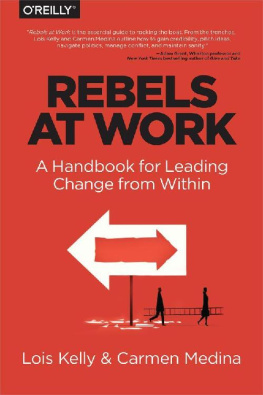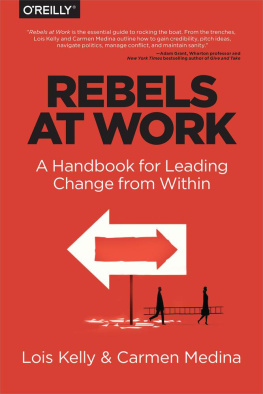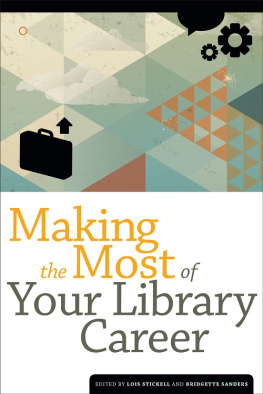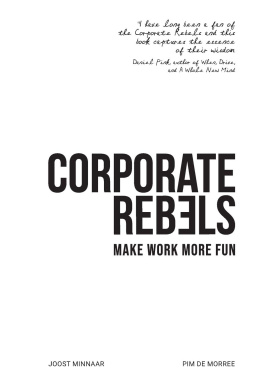Rebels at Work
Lois Kelly
Carmen Medina
Beijing Cambridge Farnham Kln Sebastopol Tokyo
Praise for Rebels at Work
This lively, accessible book is full of practical wisdom for making sure that you dont become a rebel without a job.
Adam GrantWharton professor and New York Times bestselling author of Give and Take
Rebels at Work is a brilliant guide for change activists who want to rock the boat and stay in it. As rebels at work we are too often marginalized and our great ideas go unheeded. Yet we are actually the salvation of our organizations. I love the fact that the authors are a living embodiment of what can happen when rebels get activated in a positive way. This book gives power to rebels at work everywhere. There are a few bosses out there who should be very scared!
Helen BevanChief Transformation Officer NHS IQ, National Health Service, England
Want to make change in the world? On GovLoop.com, we have 150,000+ government innovators pushing to make change in the often difficult work of bureaucracy. I cant wait to share Lois Kellys and Carmen Medinas book Rebels at Work with our community. Their clear tips and strategies are essential to becoming a Good Rebel and making big change in big organizations. As a Rebel myself, I wish this book existed ten years ago, as it would have helped me avoid numerous pitfalls and accelerate success.
Steve ResslerFounder and President, GovLoop
Useful, practical advice and support for employees who want to think differently and find their own voice in the workplace.
Dawn NottDirector, HR, Xamarin
Preface
If youre reading this book, youre an idea person. When you see something that isnt right at work, your mind starts thinking about what could work. You want to make things better.
Maybe youve tried to get the powers that be to see the value of your ideas and havent made as much progress as youd like. Or worse, youve been told that youre rocking the boat too hard and your ideas arent welcome, thank you very much. Talk about frustration, when all youre trying to do is make things better. What am I doing wrong? you wonder. What does it take to change things around here? What can I do differently?
Or, perhaps you are an idea person who has been reluctant to speak up at work because youre just not sure how to go about proposing a different way of doing things. You may be younger than most people, new to the organization, or have less formal education than your coworkers. You wonder how to be taken seriously and how to propose new approaches without jeopardizing your reputation or your job.
We used to be you. We struggled with the same questions and challenges. We made a lot of mistakes and learned the hard way about what it takes to introduce new ways of doing things at work, which is why we wrote this handbook. We wish someone had given us practical advice on how to create positive change early in our careers. Imagine, we wondered, what we might have been able to do if we had had a practical guide for changing things at work, a handbook with observations and advice about how to navigate the workplace and avoid common mistakes and traps.
Carmen worked at the US Central Intelligence Agency (CIA) and Lois worked for big companies and marketing agencies. While our careers couldnt have been more different, our observations of what it takes to be a successful change maker, or what we call a good rebel, have been remarkably similar. (See for details on what we mean by good rebels.)
Since we met at an innovation conference in 2010 and found we share a passion for helping good rebels inside all types of organizations, we have spent thousands of hours interviewing and writing about good rebels in all walks of work, from all over the world. All of their stories and advice, while distinct, are similar. Together, we share the following characteristics:
- We want to make things better at work.
- We believe the best ideas come from the people doing the work.
- We cant bear the thought of working at a job without possibilities for change and growth.
- We dont want to become angry or complacent or get thrown under the bus.
- We need and want help from other people like us.
Whom This Handbook Is For
We didnt write this book for managers, although we suspect many managers will find much that is useful in it. We wrote this book for the people doing the work, especially for those who care about doing their own jobs as best as they can and who want to help their organizations, companies, or government agencies do better as well.
Organizations being what they are, people often have to wage a minor insurgency to have their voices heard. Thats one of the reasons we call ourselves (and others like us) rebels at work.
If youre one of the millions of people who are employees, we hope this handbook helps you become a positive force for change at work.
We dont want to suggest that were somehow anti-management. Far from it. Both of us have had plenty of opportunities to manage and lead. But when we decided to write this book, we made a deliberate choice to focus on the challenges facing employees who want to improve their place of work and dont have the official authority, power, or influence to call the shots.
Whats in This Handbook
This is the handbook we wish someone had given us. Its full of practical ideas, useful checklists, and valuable questions. It offers caring advice on what to do tactically, as well as how to manage yourself so that you grow and avoid burnout.
Heres a summary of the highlights in each chapter:
How to Use This Handbook
There are a number of ways to approach this book:
Read and reference
We invite you to read the chapters that appeal to you in the order that appeals to you, and encourage you to come back when youre about to shake things up at work again. Most of us have periods at work when things are going smoothly and our rebel skills arent needed. But when youre about to take on a new challenge, please reread the especially relevant chapters before doing anything rash.
Start a rebel book club
There are Questions to Ponder at the end of each chapter. You might consider reading this book with a group of like-minded rebels and discussing the questions after each chapter, particularly within the context of your own workplace. For the more ambitious, use the questions as a jumping-off point for a rebel training curriculum for your organization.
Join us
Be part of the Rebels at Work community. Youll find good rebel profiles, additional resources, videos, a signup form for our newsletter, and frequent blog updates based on what were hearing and learning. You can also join in the conversation on the Rebels at Work Facebook page and on Twitter. We both use the @RebelsatWork handle, as well as our personal Twitter accounts. Lois is @LoisKelly, and Carmen is @milouness.
What Youll Learn
In reading this book, youll find out how to:
- Achieve more success and less frustration
- Earn a reputation for having great ideas versus a reputation for being difficult


![Lois Kelly - Rebels at work: [a handbook for leading change from within]](/uploads/posts/book/215816/thumbs/lois-kelly-rebels-at-work-a-handbook-for.jpg)










